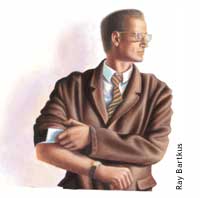As part of its Strategic Plan, HLS has instituted a program that introduces new students to the practical skills needed in the legal world. Going beyond the legal writing and research that made up the bulk of the Legal Reasoning and Argument course it replaced, the new First Year Lawyering (FYL) Program includes modules on negotiation, analytic methods, and the legal profession during the fall semester. The course continues in the spring after the Ames Moot Court and introduces topics such as motions practice, client counseling, and dispute resolution.
Visiting Professor Michael Meltsner, director of the program, said that FYL “is a lawyering course. It is not just legal research and argument. It makes available more intense writing feedback, more research options, and includes a variety of practice-related perspectives.”
As part of the new seven-section system, a lecturer with legal practice experience teaches each 80-student section for two hours a week. Students on the Board of Student Advisers (BSA) still teach sections of 12 to 14 students in a smaller workshop, as well as provide advice about adjusting to Harvard Law School.
Previously professors lectured to the students once a week, and only the BSA instructor looked at the students’ written work. Now students receive comments both from their BSA workshop instructor and from the lecturer. According to BSA president Erin Hoffmann ’02, students are now getting better written feedback. “I read every paper [in my workshop], in addition to the lecturer, and we concentrate on different areas of the memo,” she said. Students also benefit from separate one-on-one meetings with their BSA instructors and lecturer.
In another change, second-year students on the BSA are required to team-teach with third-year students.
“I like having a 2L and 3L a lot,” first-year student Jennifer Zachary said. “The 2L relates a little more to what we’re going through because he was just there. The 3L has more of the big picture and can tell us what is or is not really important. They take turns teaching in our workshop, and both have a different perspective.”
The grading system has also changed, going from pass/fail to high-pass/pass/low-pass/fail under FYL, which some students have criticized. “I worry that somebody is going to work hard and then get a low-pass,” first-year student Daniel Smith said.
“FYL is certainly not out to fail anyone,” Meltsner said, “but it does take evaluation seriously, and one way that is expressed is a somewhat more differentiated grading system than in the past.”
Some students are also questioning the material presented in the two-hour lecture to the full section. “I feel like I’m learning, but if I had to make constructive criticisms of the program, I would suggest either reducing the amount of time we have in the lecture or using the lecture to cover more ground,” first-year student Greg Comeau said.
Meltsner acknowledges that changes will be made in the program. “It is already obvious that we need to shorten classes and spread out assignments,” he said.
Hoffmann hopes the lecture will provide students with opportunities they could not get in the workshop alone. “The closer we get to something interactive in the lecture, the better off we’ll be,” she said. “I’d also like to see the lecturers bring in more things from their practice. Real-world experience is what they really bring to this program.”
–Lauren Rothenberg ’02
